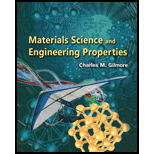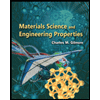
Materials Science And Engineering Properties
1st Edition
ISBN: 9781111988609
Author: Charles Gilmore
Publisher: Cengage Learning
expand_more
expand_more
format_list_bulleted
Textbook Question
Chapter 6, Problem 10ETSQ
At the ultimate tensile strength.
(a) The true stress is at its maximum.
(b) The specimen always fractures.
(c) The maximum load-carrying capacity is experienced.
(d) The material yields.
Expert Solution & Answer
Trending nowThis is a popular solution!

Students have asked these similar questions
As shown, an aluminium alloy construction BCD with a circular cross section is fixed at end B and affected by a force of 150 N at the free end D. The diameter of the cross-section a-a is 20 mm. The yield strength of the material is 80 MPa:
a) Determine the stresses at point A of the a-a cross-section. As indicated in the picture, draw the stress element in Cartesian coordinates and specify the stress values.(b) Calculate the factor of safety, n for Tresca, and the von Mises yield criterion to see if the structure would yield based on the stresses at point A.(c) In the major stress area, draw the yield loci of both criteria and indicate the operational stress state & why is the Rankine failure criterion inappropriate for aluminium alloys?
An aluminum alloy [E = 69 GPa; v = 0.33; a = 23.0 x 10-6/°C] plate is subjected to a tensile load P. The plate has a depth of d = 215 mm,
a cross-sectional area of A = 5100 mm2, and a length of L = 3.9 m. The initial longitudinal normal strain in the plate is zero. After load P
is applied and the temperature of the plate has been increased by AT = 53°C, the longitudinal normal strain in the plate is found to be
2320 με. Determine:
(a) the magnitude of load P.
(b) the change in plate depth Ad.
L
Answer:
(a) P = i
(b) Δd = = i
d
KN
mm
An aluminum alloy [E = 74 GPa; v = 0.33; a = 23.0 x 10-6/°C] plate is subjected to a tensile load P. The plate has a depth of d = 265 mm,
a cross-sectional area of A = 5300 mm², and a length of L= 4.2 m. The initial longitudinal normal strain in the plate is zero. After load P
is applied and the temperature of the plate has been increased by AT = 57°C, the longitudinal normal strain in the plate is found to be
2920 με. Determine:
(a) the magnitude of load P.
(b) the change in plate depth Ad.
L
P
Answer:
(a) P = i
(b) Δd =
i
kN
mm
Chapter 6 Solutions
Materials Science And Engineering Properties
Ch. 6 - Prob. 1CQCh. 6 - Prob. 2CQCh. 6 - Prob. 3CQCh. 6 - Prob. 4CQCh. 6 - Prob. 5CQCh. 6 - Prob. 6CQCh. 6 - Prob. 7CQCh. 6 - Prob. 8CQCh. 6 - Prob. 9CQCh. 6 - Prob. 10CQ
Ch. 6 - Prob. 11CQCh. 6 - Prob. 12CQCh. 6 - Prob. 13CQCh. 6 - Prob. 14CQCh. 6 - Prob. 15CQCh. 6 - Prob. 16CQCh. 6 - Prob. 17CQCh. 6 - Prob. 18CQCh. 6 - Prob. 19CQCh. 6 - Prob. 20CQCh. 6 - Prob. 21CQCh. 6 - Prob. 22CQCh. 6 - Prob. 23CQCh. 6 - Prob. 24CQCh. 6 - Prob. 25CQCh. 6 - Prob. 26CQCh. 6 - Prob. 27CQCh. 6 - Prob. 28CQCh. 6 - Prob. 29CQCh. 6 - Prob. 30CQCh. 6 - Prob. 31CQCh. 6 - Prob. 32CQCh. 6 - Prob. 33CQCh. 6 - Prob. 34CQCh. 6 - Prob. 35CQCh. 6 - Prob. 36CQCh. 6 - Prob. 37CQCh. 6 - Prob. 38CQCh. 6 - Prob. 1ETSQCh. 6 - Prob. 2ETSQCh. 6 - Prob. 3ETSQCh. 6 - Prob. 4ETSQCh. 6 - Prob. 5ETSQCh. 6 - Prob. 6ETSQCh. 6 - Prob. 7ETSQCh. 6 - Prob. 8ETSQCh. 6 - Prob. 9ETSQCh. 6 - At the ultimate tensile strength. (a) The true...Ch. 6 - Prob. 11ETSQCh. 6 - Prob. 12ETSQCh. 6 - Prob. 13ETSQCh. 6 - Prob. 14ETSQCh. 6 - Prob. 15ETSQCh. 6 - Prob. 16ETSQCh. 6 - Prob. 6.1PCh. 6 - Prob. 6.2PCh. 6 - Compare the engineering and true secant elastic...Ch. 6 - Prob. 6.4PCh. 6 - Prob. 6.5PCh. 6 - An iron specimen is plastically deformed in shear...Ch. 6 - Prob. 6.7PCh. 6 - Prob. 6.8PCh. 6 - Prob. 6.9PCh. 6 - Prob. 6.10PCh. 6 - Prob. 6.11PCh. 6 - Prob. 6.12PCh. 6 - Prob. 6.13PCh. 6 - Prob. 6.14PCh. 6 - Estimate the elastic and plastic strain at the...Ch. 6 - Prob. 6.16PCh. 6 - Prob. 6.17PCh. 6 - Prob. 6.18PCh. 6 - Prob. 6.19PCh. 6 - Prob. 6.1DPCh. 6 - Prob. 6.2DP
Knowledge Booster
Learn more about
Need a deep-dive on the concept behind this application? Look no further. Learn more about this topic, civil-engineering and related others by exploring similar questions and additional content below.Similar questions
- Compare the engineering and true secant elastic moduli for the natural rubber in Example Problem 6.2 at an engineering strain of 6.0. Assume that the deformation is all elastic.arrow_forwardA load applied to a machine component results in the state of plane stress ?x=80 MPa, ?y=100 MPa, ?xy=60 MPa. The component is made of a brittle high-strength steel that follows the maximum normal stress criterion with ?u=200 MPa. If increasing the load increases each stress component proportionally, determine the percentage increase that can be applied before the component fails.arrow_forwardAn aluminum alloy [E = 67 GPa; ν = 0.33; α = 23.0 × 10–6/°C] plate is subjected to a tensile load P. The plate has a depth of d = 225 mm, a cross-sectional area of A = 5100 mm2, and a length of L = 4.1 m. The initial longitudinal normal strain in the plate is zero. After load P is applied and the temperature of the plate has been increased by ΔT = 63°C, the longitudinal normal strain in the plate is found to be 2900 με. Determine: (a) the magnitude of load P. (b) the change in plate depth Δd.arrow_forward
- The assembly shown consists of an aluminum shell (E,= 70 GPa, a, = 23.6 × 10-6rC) fully bonded to a steel core (Es = 200 GPa, as = 11.7 x 10-6rC) and the assembly is unstressed at a temperature of 20°C. Considering only axial deformations, determine the stress in the aluminum when the temperature reaches 215°C. 200 mm 20 mm Aluminum shell Steel 50 mm core The stress in the aluminum is MPa.arrow_forwardFor a point on a steel specimen, the principal stresses are known to be 01 = 360 MPa and O2 = 60 MPa. Calculate the minimum yield stress of the material according to the Tresca criterion. Give your answer in MPa to 3 significant figures.arrow_forward2. The Goodman diagram relates oa and om for fatigue failure after a specific number of cycles Nf, where da is the cyclic stress amplitude, and om the mean stress. For a steel specimen it is found that oa oa (0). [1- (om/OTS)] where Ors is the metal's tensile stress (375MPa), and oa (0)~0.450TS is the 107 cycle fatigue limit at zero mean stress. Assuming the specimen is cycled repeatedly between 0 stress and a peak stress, what is the maximum peak stress if failure in < 107 cycles is to be avoided? Ans: 233 MPaarrow_forward
- 2. The Goodman diagram relates oa and om for fatigue failure after a specific number of cycles N₁, where da is the cyclic stress amplitude, and on the mean stress. For a steel specimen it is found that a = a (0). [1- (om/OTS)] where GTS is the metal's tensile stress (375MPa), and oa (0)~0.450TS is the 107 cycle fatigue limit at zero mean stress. Assuming the specimen is cycled repeatedly between 0 stress and a peak stress, what is the maximum peak stress if failure in < 107 cycles is to be avoided? Ans: 233 MPaarrow_forwardA steel component is subjected to alternate cyclical loading. The steel follows Basquin's law for high cycle fatigue, o, x N = C, (where the stress amplitude is in MPa). Ignore the geometric detail and assume that Marin's modifying factors are all equal to 1. You are given the minimum stress ain = -213 MPa, the maximum stress omax = 213 MPa. The material data are Tensile strength oUTS = 539 MPa, Basquin's constant c, = 875 MPa, Basquin's exponent a = 0.085. a) Calculate the stress ratio R, the stress amplitude o, in MPa and the mean stress am in MPa. The answers are acceptable with a tolerance of 0.01 for R and of 1 MPa the stresses. R: MPa MPа b) Calculate the corresponding life, in 10° cycles, (tolerance of 0.1 106 cycles) N :arrow_forwardPlease solve it fast A mild steel specimen having Young’s modulus of 200 GPa and original length of 300 mm is tested for a stress of value 500 MPa. Find the resultant elongation in the specimen.arrow_forward
- At an axial load of 20 kN, a 35-mm-wide by 10-mm-thick polyimide polymer bar elongates 2.7 mm while the bar width contracts 0.15 mm. The bar is 240 mm long. At the 20-kN load, the stress in the polymer bar is less than its proportional limit.Determine(a) the modulus of elasticity.(b) Poisson’s ratio.(c) the change in the bar thickness.arrow_forwardAt an axial load of 25 kN, a 45-mm-wide by 15-mm-thick polyimide polymer bar elongates 3.1 mm while the bar width contracts 0.18 mm. The bar is 240 mm long. At the 25-kN load, the stress in the polymer bar is less than its proportional limit. Determine (a) the modulus of elasticity. (b) Poisson's ratio. (c) the change in the bar thickness. Answers: (a) E= (b) v = (c) Athickness= i GPa mmarrow_forward1.4-7 The data shown in the table below were obtained from a tensile test of high-strength steel. The test specimen had a diameter of 13 mm and a gage length of 50 mm (see figure for Prob. 1.4-3). At fracture, the elongation between the gage marks was 3.0 mm and the minimum diameter was 10.7 mm. Plot the conventional stress-strain curve for the steefor the steel and determine the proportional limit, modulus of elastics of elastic- ity (i.e., the slope of the initial part of the stress-strain,tress-strain curve), yield stress at 0.1% offset, ultimate stress, percent, elongation in 50 mm, and percent reduction in area. 'ess, percent area. TENSILE-TEST DATA FOR PROB. 1.4-7 Elongation (mm) 0.005 0.015 0.048 Load (kN) 5 10 30 50 0.084 60 0.099 64.5 0.109 67.0 0.119 68.0 0.137 69.0 0.160 70.0 0.229 72.0 0.259 76.0 0.330 84.0 0.584 92.0 0.853 100.0 1.288 112.0 2.814 113.0 Fracturearrow_forward
arrow_back_ios
SEE MORE QUESTIONS
arrow_forward_ios
Recommended textbooks for you
 Materials Science And Engineering PropertiesCivil EngineeringISBN:9781111988609Author:Charles GilmorePublisher:Cengage Learning
Materials Science And Engineering PropertiesCivil EngineeringISBN:9781111988609Author:Charles GilmorePublisher:Cengage Learning Principles of Foundation Engineering (MindTap Cou...Civil EngineeringISBN:9781337705028Author:Braja M. Das, Nagaratnam SivakuganPublisher:Cengage Learning
Principles of Foundation Engineering (MindTap Cou...Civil EngineeringISBN:9781337705028Author:Braja M. Das, Nagaratnam SivakuganPublisher:Cengage Learning

Materials Science And Engineering Properties
Civil Engineering
ISBN:9781111988609
Author:Charles Gilmore
Publisher:Cengage Learning

Principles of Foundation Engineering (MindTap Cou...
Civil Engineering
ISBN:9781337705028
Author:Braja M. Das, Nagaratnam Sivakugan
Publisher:Cengage Learning
Material Properties 101; Author: Real Engineering;https://www.youtube.com/watch?v=BHZALtqAjeM;License: Standard YouTube License, CC-BY